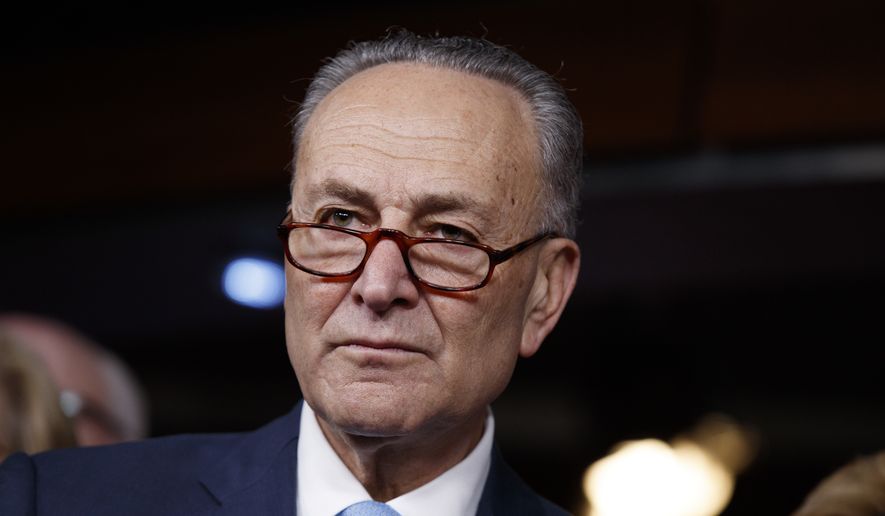Hoping to force the GOP’s health care plans out of the shadows, a top-ranking Democrat invited Senate Republicans to engage in a bipartisan negotiation next week over the future of Obamacare.
Senate Minority Leader Charles E. Schumer said plans to overhaul one-sixth of the economy must be done in broad daylight, as a working group of 13 GOP senators work behind the scenes on a rewrite of a House-passed bill to repeal and replace the 2010 law.
“We believe we all owe it to our constituents to meet to discuss your potential legislation that would profoundly impact so many American lives,” Mr. Schumer, New York Democrat, wrote to Senate Majority Leader Mitch McConnell.
“The U.S. Senate has long been considered the world’s greatest deliberative body and, as members of that body, we should each support open and robust debate,” he added. “That is why we are dismayed at the reports that there will be no public hearings on your proposed changes to the American health care system.”
Debate around the Senate GOP’s health care plan has focused on process rather than substance in recent weeks, since barely anyone in Washington — even Senate Republicans themselves — seems to know what’s in the emerging legislative text.
Liberal groups are sounding the alarm over the GOP’s push, fearing Mr. McConnell will rush a bill to the floor before the July 4th holiday.
Mr. Schumer hearkened to a golden era of debate in his appeal to Republicans, saying the senators should meet in the old Senate chamber for the listening session.
His appeal comes one day after Senate Republicans and Democrats linked arms and voted, 98-2, to impose new sanctions Iran and also Russia, moving to punish Moscow for transgressions against Ukraine and for meddling in the U.S. election last year.
Mr. Schumer said the parties can, in fact, still work together despite well-documented acrimony in recent years — a rift that’s being re-examined in the wake of this week’s attack on Republican congressmen at a baseball practice.
“To too many of us on both sides of the aisle, it seems when there’s divisiveness, it gets far greater attention in the media than when there’s comity between the parties,” he said.
Governors from both parties also called on Congress to put partisanship aside Friday, saying it would result in a better product than the House-passed bill.
“While we certainly agree that reforms need to be made to our nation’s health care system, as governors from both sides of the political aisle, we feel that true and lasting reforms are best approached by finding common ground in a bipartisan fashion,” seven governors wrote to Senate leaders.
The governors said the House bill falls short, particularly for those with mental illness, chronic health problems and drug addiction, while shifting costs to the states. They also said dramatic cuts to federal funding for Medicaid, the government insurance program for the poor, are “particularly problematic.”
The letter was signed by Democratic governors Steve Bullock of Montana, John Bel Edwards of Louisiana, John W. Hickenlooper of Colorado and Tom Wolf of Pennsylvania and Republican governors Charles D. Baker of Massachusetts, John Kasich of Ohio and Brian Sandoval of Nevada.
The latter two Republicans are significant, since Republican Sens. Rob Portman of Ohio and Dean Heller of Nevada are considered key swing votes for the emerging GOP plan.
In Washington, however, the parties remain far apart on health care.
President Trump has repeatedly called Democrats “obstructionists” for opposing his push to scrap the Obamacare program, which is suffering from rising premiums and dwindling choices on its insurance exchanges.
Yet Senate Republicans are mostly trying to get out of their own way, as they struggle to pin down 50 votes from their narrow majority under fast-track budget rules that allow them to avoid a filibuster of their plans.
Democrats have said they’re willing to work with the GOP majority if they take repeal of the 2010 Affordable Care Act off the table.
Yet many of the Democrats’ ideas involve a larger federal footprint in health care, such as more generous subsidies or a government-run “public option” plan — things Republicans have derided as “more Obamacare.”
“Other than a government-run, single-payer system, we’ve yet to see any proposals from our friends across the aisle,” McConnell spokesman Donald Stewart said. “A good starting point for discussions would instead be for our friends to propose ideas on how they can help us rescue Americans from the consequences of Obamacare.”
Though Democrats are unlikely to abandon their signature program, Mr. Stewart said Mr. Schumer’s letter appeared to acknowledge Obamacare’s problems and did not say anything about taking repeal off the table.
“Now that Obamacare is continuing to implode, they’ve apparently dropped that precondition for discussions,” he said. “I can only assume this means they are now open to repeal — that is a great first step.”
• Tom Howell Jr. can be reached at thowell@washingtontimes.com.




Please read our comment policy before commenting.